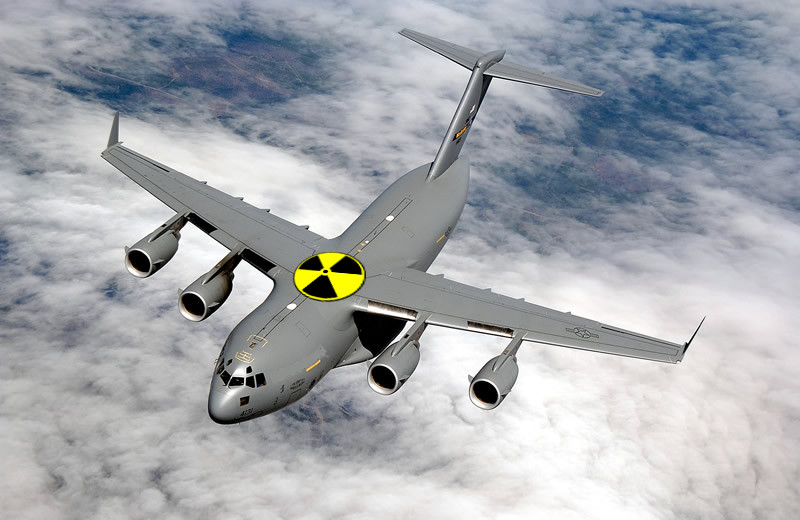Military nuclear materials are flown across the South of England and South Wales around four times a year on average, according to new information revealed by the Ministry of Defence (MoD) in answer to a Parliamentary Question. The materials, in transit between the USA and the UK, are essential to the UK's nuclear weapons and nuclear submarine programmes.
The information was revealed in the answer to a Parliamentary Question asked by the Scottish National Party's Westminster group defence leader Brendan O'Hara.
Minister for Armed Forces Penny Mordaunt said that in the last five years 23 flights carrying defence nuclear materials had been undertaken, and that all flights took place between the UK and the United States on fixed wing aircraft under the control of UK armed forces. Further information about the physical state, mass and radiological quantities of the materials transported was not released as it was claimed that this might prejudice national security.
The flights are known to transport the following cargoes:
- Tritium – a component of nuclear warheads which has a half life of only 12 years and needs to be replenished regularly. The UK does not have the capacity to produce tritium and has to buy it from the USA.
- Highly enriched uranium for submarine reactor fuel (also used in warhead components) which must also be sourced from the USA. It is believed that the UK supplies enriched uranium (around 20%) to the USA, where it is then further enriched to around 95% for use as fuel and then returned.
- Samples of nuclear materials for tests and assays.
- Components of warheads which require testing using unique facilities at US nuclear weapons laboratories.
- Non-nuclear warhead components which must be transported securely.
The exchanges of nuclear materials and warhead components take place under the auspices of the 1958 US-UK Mutual Defense Agreement, which allows the US to assist the UK's nuclear weapons and naval nuclear propulsion programmes through the supply of special nuclear materials and exchange of information.
The flights arrive at and depart from RAF Brize Norton in Oxfordshire, close to the Atomic Weapons Establishment (AWE) in Berkshire. Special convoys carrying secure cargoes have been sighted travelling between both the AWE Aldermaston and AWE Burghfield sites and Brize Norton, travelling along the M4 and A34 routes past Oxford during the 90 minute journey.
From Brize Norton loads are transported by Royal Air Force C17 Globemaster aircraft to the USA. The flights head west from Brize Norton, taking one of two flight paths which take them either over the northern part of Bristol, over Cardiff, and then along the Bristol Channel, or on a route slightly to the north which passes over Cirencester, Newport, the South Wales Valleys, and Swansea before heading out to sea.
Welsh local authorities underneath the flight paths are listed in the Ministry of Defence's Local Authority Emergency Services Information (LAESI) nuclear accident guidelines, and in 2011 emergency services rehearsed the response to an accident involving a flight carrying defence nuclear materials during the 'Astral Bend' Ministry of Defence emergency exercise at the Caerwent military training area in Monmouthshire.
The destination for the flights is Dover Air Force Base in Delaware, on the US eastern seaboard, from where cargo from the UK is transported onwards by the US authorities to US nuclear weapons laboratories and test sites. The loads are believed to be transported onwards by road, as it has been claimed that the special packages used by MoD to transport nuclear cargoes do not meet US safety standards for the air transport of radioactive materials.
Cargoes from the USA to the UK are transported by the same system in the opposite direction.
It is anticipated that, in addition to nuclear flights between the UK and the USA, flights carrying nuclear cargoes between the UK and France will soon commence to allow UK nuclear warhead components to be tested at the Valduc nuclear site in France under arrangements set out in the 'Teutates' UK-France nuclear co-operation treaty.
